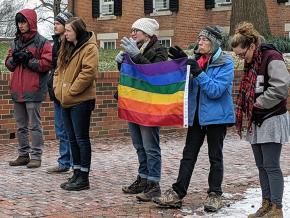We demand justice for delfin bautista
reports on an action that defied Ohio University’s protest ban to stand up for the LGBT Center director, who was fired a day earlier without explanation.
SOME 60 protesters confronted Ohio University (OU) President Duane Nellis in Athens, Ohio, on January 11 to oppose the sudden firing of delfin bautista, the director of OU’s LGBT Center.
After a round of speeches, protesters briefly moved inside the president’s building while he was in his office. Chanting “Shame!” the crowd demanded that Nellis explain to the crowd why bautista was terminated. This action was in defiance of OU’s so-called “freedom of expression” policy — otherwise known as the protest ban — which bars protests inside of university buildings.
Conveniently for the administration, bautista’s termination was announced a few days before classes started for the spring semester — while most students were still out of town and unable to respond. The decision came as a surprise, and so far, the OU administration has given no reason for the firing.
Once the news broke on January 10, a network of activists and organizations called for a protest the following day. Activists and organizers with Showing Up for Racial Justice (SURJ), the International Socialist Organization (ISO), United Campus Ministry (UCM) and other activists quickly mobilized people to come out the next day.

The members of these organizations are mostly community members, not students — a force that OU probably was not counting on to challenge its decision. This united front action was possible thanks to already-existing relationships forged in prior organizing efforts, such as the recent effort to pass Ohio ballot issue 1.
Still, there was also a student component to the rally — in particular an activist group called Swarm, some of whose members work in the LGBT Center that bautista directed. While most speeches at the rally focused on defending the personal merits of bautista, Swarm made an important additional contribution to the rally’s content.
Swarm argued that the administration isn’t listening to what its students want, and that it will only listen if enough pressure and disruption is applied. In fact, Swarm’s name is an indication of the group’s philosophy. Their speaker at the rally made the case for pestering administrators with collectives of people acting as a swarm of bees, attacking, stinging and disrupting OU to make it a better place.
After the speeches ended, protesters moved inside the building where Nellis was, demanding he speak to us. Instead, four campus police officers arrived and threatened to arrest anyone who didn’t leave the building. Everyone present was able to safely leave without arrest.
That being said, defying the protest ban was one of the most militant political actions taken at OU since the ban was introduced more than a year ago. The protest ban was announced after OU failed to win charges of trespassing against 70 students who demanded that OU become a sanctuary campus earlier that year while occupying a university building.
It’s still unclear why bautista was terminated, which is why our main demand is and should be transparency: we deserve to know why OU fired bautista without any input from students or other LGBT Center staff. Given that bautista has often been an outspoken activist for LGBT rights at OU, often leading and attending rallies, there is a question about whether this decision was political retribution.
Beyond transparency, OU also needs to promise full funding for the LGBT Center, and it should be the staff and students affected by the LGBT Center who decide what full funding means.
The rapid mobilization of 60 people to defend bautista at a time when most students were out of town shows there is potential to build an even larger movement for expanded LGBT protections and rights in Athens and at OU. Moreover, the brief occupation of a university building shows that a revived militancy, in addition to higher numbers of people, is possible.
One of the pressing issues facing Ohio’s LGBTQI community is the lack of legal employment or housing protections for trans people in Ohio. That needs to change.
The people and organizations mobilized on bautista’s behalf can also collectively fight for such protections while we simultaneously organize to demand transparency regarding bautista’s termination.


